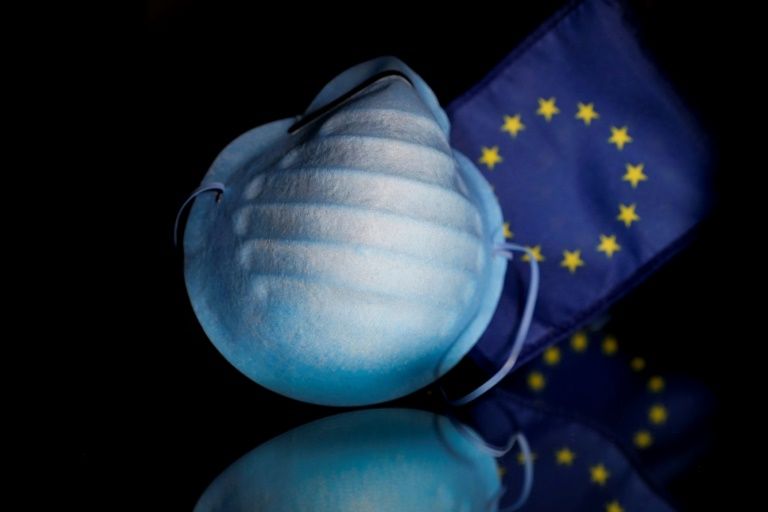EU leaders to get together to seek virus plan
The coronavirus crisis is pushing the EU to grapple with an old institutional problem — the lack of joint borrowing to fund major projects for the bloc. ©AFP/File Kenzo TRIBOUILLARD
Divided EU leaders will meet in person next month to negotiate how to raise and then distribute a major recovery fund to revive a European economy ravaged by the coronavirus pandemic.
The 27 held a video summit Friday to discuss a proposal from European Commission chief Ursula von der Leyen for a 750-billion-euro ($840-billion) rescue fund that, if accepted, would mark a historic milestone for EU unity.
The plan is to help EU countries fight the devastating recession caused by the virus outbreak whose effects are expected to grow worse and be felt for years to come.
“It’s no exaggeration to say we are facing the biggest economic challenge in the history of the European Union,” Chancellor Angela Merkel said after the summit.
Leaders agreed that a solution should be found by the end of July, with summit host Charles Michel, president of the European Council, wanting a face-to-face meeting around mid-month — if coronavirus restrictions allow — to push a deal over the finish line.
“There is an emerging consensus, which is very positive, but at the same time, we don’t underestimate the difficulties,” said Michel, who will have tough task to draw up the compromise over the coming weeks.
But a sceptical Dutch leader, Prime Minister Mark Rutte poured cold water on hopes for a rapid decision at a July summit.
“It is uncertain whether it would be finalised then or whether we would need more sessions, or whether they should be during the summer or later. We are going to look at all of that,” he said.
– ‘Frugal four’ –
European Central Bank chief Christine Lagarde, also in attendance, warned that doing nothing could have serious consequences on the markets.
The faster the package is agreed the better for the EU economy, she is reported to have told leaders, according to sources familiar with the meeting.
Michel, a former Belgian prime minister, faces sniping from countries known as the “frugal four” — The Netherlands, Sweden, Denmark and Austria — who have promised to fight to trim the von der Leyen plan.
At the heart of the dispute is whether the money will be distributed as subsidies or loans, the latter preferred by the “frugals” who say they are necessary to force countries to enact reforms.
Staunchly defending the argument for subsidies are countries such as Italy and Spain that were the first and hardest hit by the pandemic, and quickly asked for help from their better-off partners.
Crippled with overstretched finances, these countries lack the ability to fight the recession with a wave of extra spending and are looking for a highly visible act of solidarity from other countries.
– ‘Focus on content’ –
The commission’s plan is inspired by a German and French proposal in which EU money is raised on the financial markets to spend Europe-wide in the biggest slice of joint borrowing ever undertaken by the union.
Merkel, whose country takes over the EU’s rotating presidency on July 1, said all 27 leaders had accepted this principal.
Last month, Germany backing of the big loan broke a long-held taboo against pan-European borrowing in a move that caught the “frugals” off guard.
They have vowed nonetheless to fight on and refused to be rushed despite the depth of the coronavirus crisis that has wreaked havoc on the world economy.
“It’s fine that other countries put up the pressure, but we focus on content,” Rutte said.
Swedish Prime Minister Stefan Lofven said there would need to be “some big improvements” before any deal could be struck.
Other points of contention include the allocation of funds, which critics said went disproportionally to countries that were not badly affected by the crisis.
– ‘No petrol’ –
To help pay for the recovery plan, the proposal floats EU-wide taxation on big tech, or carbon emissions, to provide the European Commission with funds of its own.
A recovery plan without own-resources would be like “a motor without petrol”, a European source warned.
But this too could prove too controversial for several member states that are loath to see the EU financially self-sufficient and too close in spirit to a federal government like in the United States.
Alex PIGMAN
(AFP)
Disclaimer: Validity of the above story is for 7 Days from original date of publishing. Source: AFP.


